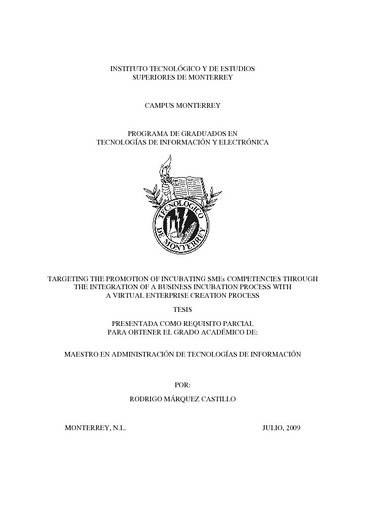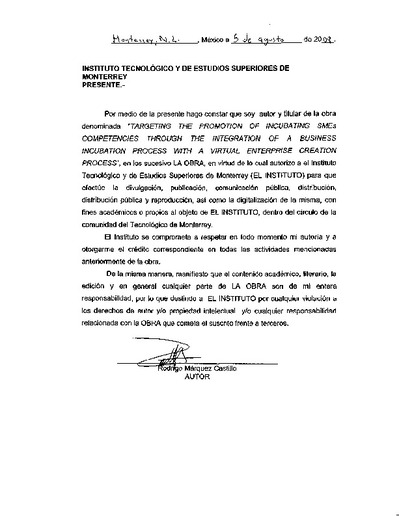| dc.contributor.advisor | Molina Gutiérrez, Arturo | |
| dc.creator | Rodrigo Márquez Castillo | |
| dc.date.accessioned | 2015-08-17T10:18:31Z | en |
| dc.date.available | 2015-08-17T10:18:31Z | en |
| dc.date.issued | 2009-07-01 | |
| dc.identifier.uri | http://hdl.handle.net/11285/569282 | en |
| dc.description.abstract | Nowadays, Small and Medium Enterprises (SMEs) represent most of the income in the economies
around the World. In spite of their undeniable importance, SMEs are highly prone to fail,
in Mexico for example: around 90% of the SMEs go bankrupt before reaching their first year
of existence, and this problem is caused very often by the little effectiveness of the companies
to commercialize their products and/or services.
On the other hand, due to their informality and size, SMEs are managed generally by their
owners, who usually lack of managing skills though they stand-out in operative-oriented skills
caused by their closeness to company’s daily operation. This situation represents a threat for
the existence of SMEs because of the need of developing business skills in order to sell their
products and/or services.
The competency-based collaboration, achieved through a Virtual Enterprise creation process,
allows companies to promote their competencies in the same way as they promote their products
and services; this kind of collaboration generates two important advantages for companies,
the first one is the raise in the number of markets they will be able to reach and the second one is
their involvement in collaboration business opportunities. Companies that belong to incubation
stages are prone to adopt a schema of collaboration based-on competencies integration because
incubation is the time when companies define important aspects like products and services
that they will offer to the market and the competencies required to produce them.
In order to allow incubating companies to collaborate using a competency-based collaborative
model, this research work proposes the integration between the ITESM business incubation
model and the Virtual Enterprise creation process developed by ECOLEAD project. To achieve
the proposed integration a modeling exercise including the ITESM business incubation processes
and the Virtual Enterprise creation process using Business Process Modeling Notation (BPMN)
and Business Process Integration concepts was carried-out.
Finally, it was developed a prototype tool implementing the business process integration
previously described. This tool was designed using a Service Oriented Architecture (SOA)
to facilitate the implementation of the Web Services needed to carry-out the proposed
integration. | |
| dc.language | spa | |
| dc.publisher | Instituto Tecnológico y de Estudios Superiores de Monterrey | |
| dc.rights | info:eu-repo/semantics/openAccess | |
| dc.rights.uri | http://creativecommons.org/licenses/by-nc-nd/4.0 | * |
| dc.subject.classification | Area::INGENIERÍA Y TECNOLOGÍA::CIENCIAS TECNOLÓGICAS::TECNOLOGÍA INDUSTRIAL::PROCESOS INDUSTRIALES | es_Mx |
| dc.title | Targeting the Promotion of Incubating SMEs Competencies Through the Integration of a Business Incubation Process with a Virtual Enterprise Creation Process-Edición Única | en |
| dc.type | Tesis de maestría | |
| dc.contributor.department | Tecnológico de Monterrey, Campus Monterrey | en |
| dc.contributor.committeemember | Pérez Guardado, Miguel Ángel | |
| dc.contributor.committeemember | Espadas Pech, Javier Mijail | |
| dc.contributor.mentor | Acevedo Mascarúa, Joaquín | |
| refterms.dateFOA | 2018-03-17T01:53:59Z | |
| refterms.dateFOA | 2018-03-17T01:53:59Z | |
| dc.identificator | Campo||7||33||3310||331003 | |


